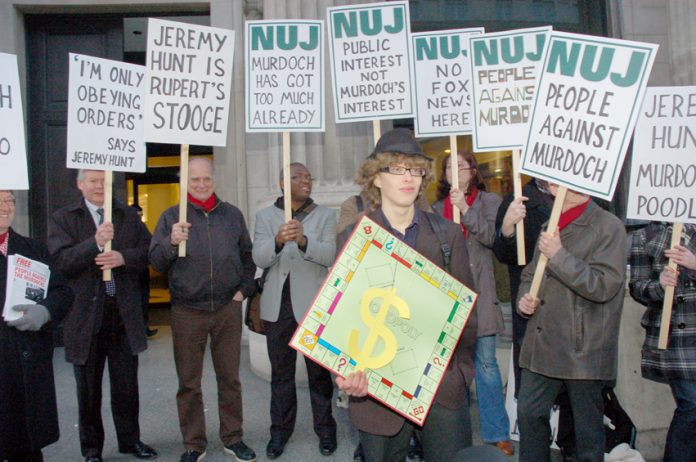THE decision of the Telegraph Media Group (TMG) to appoint former Cameron spin doctor Andy Coulson to provide PR advice to the company has been described as ‘gobsmacking’ by the National Union of Journalists NUJ).
The announcement came on Thursday as TMG also confirmed plans to outsource editorial production to the Press Association in Howden, Yorkshire, placing 45 jobs at risk.
Former News of the World editor Coulson resigned from the paper after its royal editor, Clive Goodman, and a private investigator, Glenn Mulcaire, were imprisoned for hacking into voicemail messages left for royal aides.
Coulson, who claimed he knew nothing about the hacking, was subsequently hired by Tory PM David Cameron as his Downing Street director of communications. But in January 2011, he resigned as Downing Street spin doctor, as coverage of the hacking scandal intensified, especially after it was revealed that the phone of murdered schoolgirl Millie Dowler had been hacked, and in June 2014 Coulson was found guilty of conspiracy to hack phones.
He was sentenced to 18 months in prison, but ended up serving just five months.
Telegraph Media Group chief executive, Murdoch MacLennan is regarded as one of Coulson’s closest friends and gave evidence on his behalf at his trial.
Confirming the appointment MacLennan said: ‘We have a good working relationship with Andy, who has written for us a couple of times. We feel his company will add value to the business.’
Journalists working for the Daily Telegraph said they are ‘shocked’ and ‘saddened’ by the appointment, with one saying: ‘This cannot do anything but harm to our brand.
‘It will deliver a severe blow to the credibility of our journalism.’
Acting NUJ General Secretary Séamus Dooley said: ‘While ex-convicts are entitled to rehabilitation nothing in the behaviour of Andy Coulson suggests that this is an appropriate appointment. Coulson Chappell (the public relations firm Coulson started upon leaving prison) claim to provide “discreet corporate strategy and communications advice, from a unique perspective”.
‘It is certainly true that Coulson’s contribution in terms of phone hacking and unethical behaviour sets him apart, but our members at the Daily Telegraph are stunned at the decision to hire him as a consultant, apparently to improve the image of the paper, at a time when journalists charged with maintaining standards in editorial production face redundancy.
‘Staff at the Daily Telegraph are proud of their record and need no lessons from Coulson. The image of the Daily Telegraph can best be maintained and enhanced by investment in journalism rather than spin.’
Coulson’s appointment was announced virtually with the same breath that the Telegraph revealed that it is to lay off its print sub-editors and will outsource the work to the Press Association in Howden, Yorkshire. About 45 workers’ jobs are believed to be at risk; a small core of subs will be retained in London.
The cuts follow a cull of senior writers and picture desk staff last year. The Telegraph is following the footsteps of the Mirror to Howden, which outsourced some of its subbing until the Press Association terminated the contract.
Laura Davison, NUJ national organiser, said: ‘This news will come as another body blow to Telegraph staff; many of those at risk will be long serving people who live and breathe the paper. Members will want to know why the management is prepared to take the risk of outsourcing subbing when other companies have tried it and the track record is one of abject failure.
‘It is also concerning what effect the cuts will have on the digital operation.
‘Subs work across print and digital and their contribution is essential to the paper’s efforts in this regard. We will use the consultation process to urge the paper to reconsider and keep jobs in house.’
Coulson’s appointment at the Telegraph follows former Tory Chancellor George Osborne’s appointment as editor of the Evening Standard. Laura Davison, NUJ national organiser, said at the time of Osborne’s appointment: ‘It feels like we’re entered an alternative reality where #fakenews is suddenly true. There will be shock and disbelief among staff at this announcement.
‘Genuinely qualified journalists who would have done this hugely important job seriously are seeing it snatched away in a blatant, cynical political move. While George Osborne won’t stand down as an MP and will spend his afternoons in parliament, staff on the paper are being asked to take pay cuts and reduce their hours because the second edition has been scrapped. We’ll be asking the London Assembly to scrutinise this move as part of their investigation into the state of London media.’
• Johnston Press, publisher of the national i, and 200 regional publications, including the Scotsman and Yorkshire Post, has announced a £300m pre-tax loss in 2016 and a writedown of its titles.
The NUJ said journalists on the ground are bearing the brunt of continuing budget cuts while questioning the strategy of the newspaper group’s chief executive officer Ashley Highfield. He cited falling advertising following Brexit for the loss of revenues, which dropped by 8 per cent to £222.7m last year.
The company’s net debt increased from £179m to £203.9m last year. The company said it had saved 26m in 2016 and a total of 100m since 2012. The union said it appeared more difficult to assess the accounts as directors’ remuneration – £1.2m – was lumped together in the overall figure for staff costs, but that it appeared long-term share incentive plans were costing more.
Laura Davison said: ‘Journalists at Johnston Press remain unconvinced by the company’s strategy. It’s them who are continuing to bear the brunt of the cost-cutting programme which has resulted in £100 million taken out since 2012.
‘That translates into the lost jobs of colleagues, increased work for those who have stayed and most recently an unwelcome pay freeze. Meanwhile as staff costs are falling, the company has maintained unrealistic profit margins and its payments under long-term share “incentive” plans at the top are rising.’
